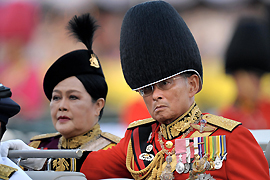Author guilty of Thai king insult
Bangkok court jails Australian writer under controverial lese majeste laws.

Speaking in court earlier, Nicolaides, who was shackled at the ankles and wore a prison uniform, said he had endured “unspeakable suffering” since his arrest five months ago and that the case had taken a toll on his health and family.
“I would like to apologise,” he said, breaking down in tears. “This can’t be real. It feels like a bad dream.”
He said he had “unqualified respect for the king of Thailand” and had not intended to insult him.
The case comes as Thai authorities step up prosecutions under the country’s controversial laws on lese majeste or insulting the monarchy, which mandates a severe sentence for “whoever defames, insults or threatens the king, the queen, the heir to the throne or the regent”.
He had faced a jail term of up to 15 years.
Arrest
|
“I would like to apologise. This can’t be real. It feels like a bad dream” Harry Nicolaides |
Nicolaides, who lived in Thailand from 2003-2005 and taught in the northern city of Chiang Rai, was arrested in August at Bangkok’s international airport as he was about to board a flight home to Melbourne.
The author was unaware of a warrant issued in March for his arrest in connection with his novel, Verisimilitude, rights group Reporters Without Borders said.
The group had urged the Thai authorities to drop the charges against him and to release him.
Nicolaides has described his book as a commentary on political and social life of contemporary Thailand, saying it was “never intended to threaten or defame the royal family”.
Laws ‘outdated’
 |
| Critics say the laws against insulting Thailand’s royal family are outdated [AFP] |
Several academics, authors and journalists are also currently facing similar charges under the lese majeste laws.
Free speech activists have condemned the laws as outdated, saying it has no place in a democracy.
Sulak Sivaraksa, a Bangkok-based social activist, said many people were critical of the strict monarchy laws in private but did not have the courage to speak up openly about changing it.
“The lese majeste laws have mostly been used by politicians to get rid of or to silence the opposition,” he told Al Jazeera, adding that even the king had a few years ago said that the law was harmful to him and detrimental to the monarchy.
“I think we should be brave to do something to have this law changed,” Sulak said.
“Unfortunately in this country the people generally have no moral courage.”
Giles Ungpakorn, a Thai academic who is himself facing charges of lese majeste, said the laws undermined democratic rights to free speech.
“This law is not about protecting the monarchy, it’s about certain groups trying to protect their privilege and their power,” he told Al Jazeera.
“Thailand is supposed to be a democracy. And in a democracy you’re supposed to be entitled to free speech.”
The severity of the lese majeste laws was highlighted last year when a Swiss man, apparently acting in a drunken frenzy, was found guilty and sentenced to 10 years for defacing images of King Bhumibol Adulyadej, the world’s longest-serving monarch.
He was pardoned by the king after serving about a month in jail.
Last week Thailand’s new prime minister, Abhisit Vejjajiva, told reporters the monarchy had to be protected because it has “immense benefits to the country as a stabilising force”, adding that his government would try to ensure the law is not abused.